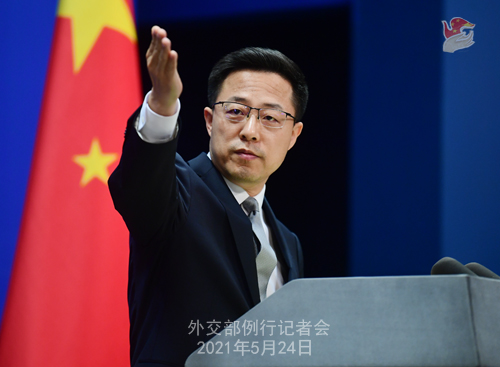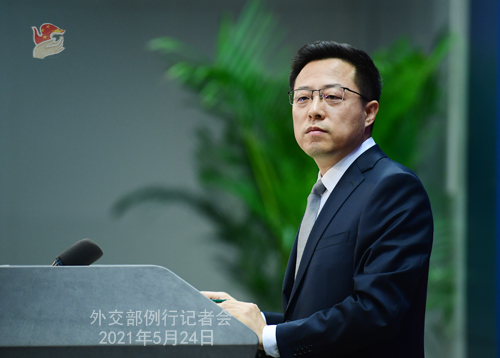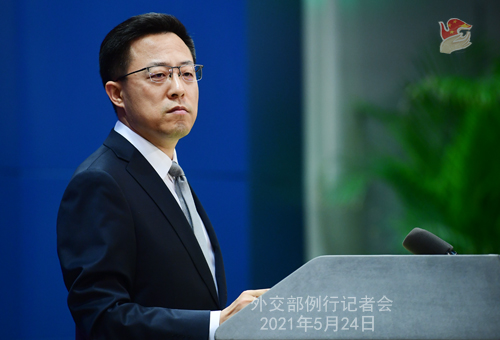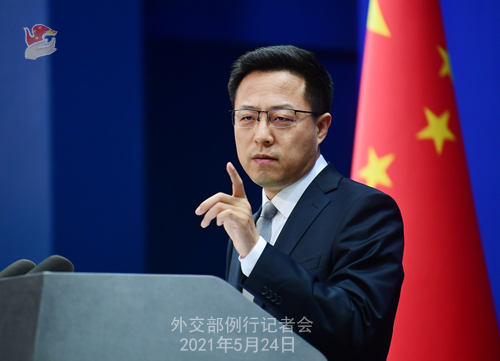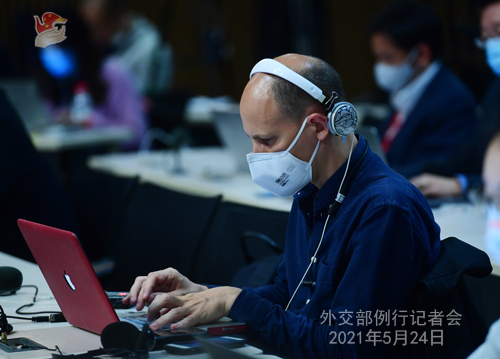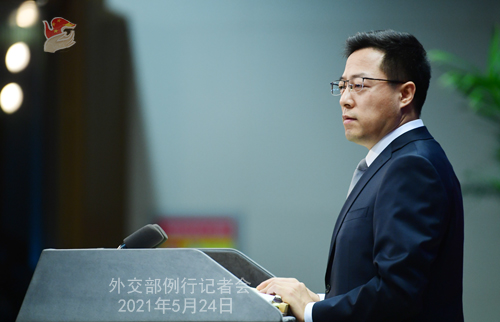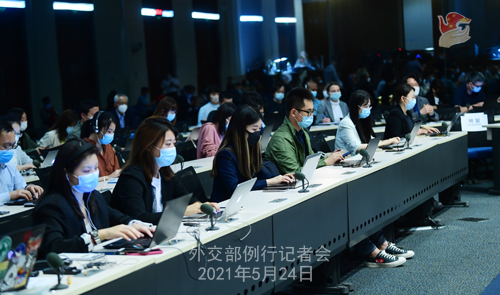| Foreign Ministry Spokesperson Zhao Lijian's Regular Press Conference on May 24, 2021 |
| 2021-05-24 21:07 |
|
JoongAng Ilbo:The leaders of the United States and South Korea pledged to strengthen US-ROK alliance after they met in Washington on May 21. What is China's position on this? When will China have face-to-face summit with other countries? Do you have any plan for that? Zhao Lijian: We noted the relevant content of the joint statement of the US and the ROK and are concerned about that. We believe that the development of US-ROK relations should be conducive to promoting regional peace, stability, development and prosperity, rather than the opposite, still less harmful to the interests of third parties including China. The joint statement mentioned issues related to Taiwan and the South China Sea. The Taiwan question is China's internal affair. It bears on China's sovereignty and territorial integrity and allows no interference by external forces. We urge relevant countries to speak and act prudentially on the Taiwan question and refrain from playing with fire. With regard to the South China Sea issue, all countries enjoy the freedom of navigation and overflight in the South China Sea in accordance with international law, and there is no problem with it. Relevant countries know these very clearly. As to international order, I want to stress that there is only one system in the world, and it is the UN-centered international order; there is only one set of rules, and it is the basic norms governing international relations with the UN Charter as its cornerstone. Neither one nor several countries are entitled to define what the international order is, still less to impose their standard on others. China always opposes relevant countries in creating small cliques targeting other countries including the "Quad" and "Indo-Pacific strategy". Such unpopular practice will not succeed and will only lead to a dead end. On your second question, I have no information to offer at this moment. CCTV: On May 21, President Xi Jinping attended and addressed the Global Health Summit via video link, putting forward five points on what needs to be done to strengthen international anti-epidemic cooperation. President Xi also announced a series of specific measures that China would take to support global fight against the epidemic. There is a lot of attention on China's announcement of an additional 3 billion US dollars in international aid over the next three years. Can you tell us a bit more? Zhao Lijian: On May 21, President Xi Jinping attended the Global Health Summit via video link upon invitation and delivered an important speech. President Xi put forward five proposals and announced five major measures to promote international anti-epidemic cooperation, charting the course for an early victory over the COVID-19 and an early recovery of the global economy. It is of great significance for boosting multilateralism, promoting international anti-epidemic cooperation and leading the reform of global health governance system. First, President Xi shared China's anti-epidemic experience in all respects at the meeting. He stressed that to completely defeat the virus, we must put people's lives and health front and center, and truly respect the value and dignity of every human life. We should advocate the spirit of science, adopt a science-based approach, and follow the law of science. We must coordinate pharmacological and non-pharmacological interventions, balance targeted routine COVID-19 protocols and emergency measures, and ensure both epidemic control and socio-economic development. These ideas and propositions are warmly received as they have been proved to be effective in China's practice, and meet the needs of countries in the fight against the virus. Second, in the face of new challenges brought by the resurgence of infections, President Xi Jinping emphasized again at the summit that we humanity rise and fall together with a shared future. We must champion the vision of building a global community of health for all, tide over this trying time through solidarity and cooperation, and firmly reject any attempt to politicize, label or stigmatize the virus. Political manipulation would not serve COVID-19 response on the domestic front. It would only disrupt international cooperation against the virus and bring greater harm to people around the world. In fact, "solidarity" and "cooperation" are the most frequently used words in President Xi's remarks. He has made it clear that solidarity and cooperation is the most powerful weapon to defeat the virus and that cooperation is like the sunshine that can dispel the dark clouds of COVID-19. Third, in response to the increasingly acute problem of uneven vaccination worldwide, President Xi pointed out that it is imperative for us to reject vaccine nationalism and find solutions to issues concerning the production capacity and distribution of vaccines, in order to make vaccines more accessible and affordable in developing countries. Major vaccine-developing and producing countries need to take up their responsibility to provide more vaccines to developing countries in urgent need. Multilateral financial institutions should provide inclusive financing support for vaccine procurement of developing countries. President Xi announced that China will provide still more vaccines to the best of its ability. China supports its vaccine companies in transferring technologies to other developing countries and carrying out joint production with them. Having announced support for waiving intellectual property rights on COVID-19 vaccines, China also supports the World Trade Organization and other international institutions in making an early decision on this matter. China proposes setting up an international forum on vaccine cooperation for vaccine-developing and producing countries, companies and other stakeholders to explore ways of promoting fair and equitable distribution of vaccines around the world. These tangible initiatives and measures demonstrate China's firm determination to engage in global efforts to tide over the difficulties and secure a victory over the epidemic. These measures will give a strong boost to international vaccine cooperation, bridge the "vaccine divide" and truly make vaccines a global public good accessible and affordable to people in all countries. China has achieved remarkable results in fulfilling its commitment to make vaccines a global public good, which stands in sharp contrast to certain country seeking selfish gains by means of politicization, stigmatization and "vaccine nationalism" in disregard of its due responsibility and morality. Four, President Xi Jinping stressed at the summit that it is important that we strengthen and leverage the role of the UN and the WHO and improve the global disease prevention and control system to better prevent and respond to future pandemics. It is important that we uphold the spirit of extensive consultation, joint contribution and shared benefits, fully heed the views of developing countries, and better reflect their legitimate concerns. It is also important that we enhance our capacity of monitoring, early-warning and emergency response, our capacity of treatment of major pandemics, of contingency reserve and logistics, of fighting disinformation, and of providing support to developing countries. Five, President Xi called on the international community to accommodate the concern of developing countries and provide them with greater support through debt relief, development assistance and capacity building. President Xi announced that China would provide an additional 3 billion US dollars in international aid over the next three years to support COVID-19 response and economic and social recovery in other developing countries. These measures have greatly enhanced the capability and confidence of developing countries in coping with the epidemic, and demonstrated the just stand of China to uphold justice and fairness and safeguard the common interests of developing countries. The practice of international anti-epidemic cooperation has proved that building a global community of health for all is the aspiration shared by people of all countries and the historical trend. It is the right way to address the common challenges of mankind and build a better world. China will join hands with the international community to deepen solidarity and cooperation, work together to overcome the epidemic, and make greater contributions to promoting steady growth of the world economy and building a global community of health for all.
Bloomberg: There have been media reports over the weekend that three researchers from the Wuhan Institute of Virology became sick enough that in November 2019 they sought medical care. Does the foreign ministry have a comment on this report? Does it have anything to add to China's previous comments about the origins of the coronavirus? My second question, Taiwan "foreign minister" Joseph Wu and "health minister" said the government is protesting not being allowed to join the World Health Assembly as an observer. Taiwan also urged the WHO to stick to professional neutrality and dismiss China's interference so that Taiwan can join the WHO meetings. Does the foreign ministry have any comment on these two questions? Zhao Lijian: Regarding your first question, the Wuhan Institute of Virology of the Chinese Academy of sciences has issued a statement on March 23. According to the statement, the Wuhan Institute of Virology had not been exposed to COVID-19 before December 30, 2019, and a "zero-infection" record is kept among its staff and graduate students so far. This January, the China-WHO joint mission made field trips to institutions including the Hubei Provincial Center for Disease Control, the Wuhan Center for Disease Control and the Wuhan Institute of Virology, and visited biosafety laboratories and had in-depth and candid exchanges with experts there. Through these field trips and in-depth visits, members of the mission unanimously agreed that the hypothesis of lab leaking is extremely unlikely. Member of the joint mission Peter Daszak said during an interview with American media that they were able to have in-depth exchanges with authoritative experts in the Wuhan Institute of Virology with a level of openness even he hadn't anticipated, when the claim of lab leaking was politicized on a global scale. The experts went to every place they asked to see, and met everyone they wanted to meet. The visit has been a great success. Meanwhile, I also want to point out that there are increasingly more reports on the virus and COVID-19 pandemic being spotted in various places around the world in the second half of 2019, and that the international community is highly concerned about the questions around the biological lab at Fort Detrick and the real intentions of the US' establishment of 200-plus overseas bio-labs. What is the real purpose for the US to continue to play up the so-called "lab leak theory"? Does it really care about the origin-tracing of the virus or just want to divert attention? We hope that the relevant departments in the US will make a clarification and explain that to the world as soon as possible. We hope that relevant parties will follow China's example, take a scientific and cooperative attitude, work with the WHO on origin-tracing, and make positive contribution to the humanity's early victory over the pandemic and better capabilities in dealing with public health emergencies in the future. On your second question, the Taiwan region's participation in the activities of international organizations including WHO must be handled in accordance with the one-China principle. This is a fundamental principle affirmed by the Resolution 2758 of the United Nations General Assembly (UNGA) and Resolution 25.1 of the World Health Assembly (WHA). Since the Democratic Progressive Party (DPP) came to power, it has placed its political agenda over the wellbeing of the people in the Taiwan region, obstinately adhered to the separatist position of "Taiwan independence", and refused to admit the 1992 Consensus embodying the one-China principle. As a result, the political foundation for the Taiwan region to participate in the WHA has ceased to exist. In order to safeguard national sovereignty and territorial integrity and uphold the solemnity and authority of relevant UNGA and WHA resolutions, China cannot agree to the Taiwan region's participation in this year's WHA. This decision by China received broad-based support and understanding from the international community. By yesterday, over 150 countries voiced their support for our decision through diplomatic channels. Over 80 WHO members sent letters to the WHO to express their commitment to the one-China principle and opposition to Taiwan's participation in the WHA. This once again shows that the one-China principle is the common aspiration and the fact that the overwhelming majority of countries hold a just and right position on the relevant issue. The DPP authority hypes up the so-called WHA participation issue with the true intention of seeking "Taiwan independence" by making capital of the epidemic. We firmly reject it. As has been proven time and again, the one-China principle is the overwhelming trend of the international community. The DPP authority's attempts will never succeed. We advise it to stop using the pandemic to engage in political manipulation and stop inviting humiliation. Bloomberg: Could you confirm it all that three people from the Wuhan Institute of Virology became so sick in November 2019 that they did go to hospital? Any more details? Zhao Lijian: I just made clear the position of the Chinese side citing the statement released by the Wuhan Institute of Virology on March 23. As a matter of fact, the Wuhan Institute of Virology had not been exposed to COVID-19 before December 30, 2019, and a "zero-infection" record is kept among its staff and graduate students so far. Therefore, the report you mentioned that three people at the Wuhan Institute of Virology fell ill is totally untrue. Beijing Daily: The UN Security Council adopted through consensus a press statement on Gaza ceasefire on May 22. China holds the rotating presidency of the Security Council. Can you share more details on that? Zhao Lijian: As the rotating president of the Security Council for May, China, together with Norway, Tunisia and France, put forward the proposal that the Council should release a press statement on the Gaza ceasefire and worked for its consensus-based adoption by all membership. The members of the Security Council welcomed the announcement of a ceasefire and recognized the important role Egypt, other regional countries, the UN, the Middle East Quartet and other international partners played in this regard. The Security Council called for the full adherence to the ceasefire and stressed the immediate need for humanitarian assistance to the Palestinian civilian population, particularly in Gaza, and supported the call for the international community to work with the United Nations on developing an integrated, robust package of support for a swift, sustainable reconstruction and recovery. The members of the Security Council reiterated the importance of achieving a comprehensive peace based on the vision of a region where two democratic states, Israel and Palestine, live side by side in peace with secure and recognized borders. China will continue to play its constructive role at the Security Council to promote the early resumption of peace talks between Palestine and Israel and to help realize a comprehensive, just and durable settlement of the Palestinian question at an early date.
Xinhua News Agency: We noted that the official Weibo account of the United Nations, the Director-General of the Food and Agriculture Organization and the President of the World Food Prize Foundation all mourned Academician Yuan Longping. Overseas media and netizens also expressed grief at the passing of him, appreciating his outstanding contributions to promoting food security, poverty alleviation and improvement of the livelihood of people. Do you have any comment? Zhao Lijian: Tributes have flooded in for Yuan Longping, a prominent Chinese scientist, recipient of the Medal of the Republic and academician of the Chinese Academy of Engineering. This shows that his contributions to the development of hybrid rice in China and beyond have been widely recognized and highly applauded. The passing of him means a huge loss to China and the world, and he will be remembered and honored forever. In China, where rice is the staple, the annual planting area of hybrid rice has exceeded 240 million mu, with the increased annual production feeding an extra 80 million people. China has succeeded in feeding one fifth of world's population with less than 9 percent of world arable land, enabling the Chinese people to hold their rice bowl firmly in their own hands. This wouldn't have been possible without Academician Yuan's strenuous effort. While securing better harvests at home, we have also shared the hybrid rice technology abroad with an open heart and a responsible attitude, a process in tandem with China's opening-up. In 1979, China provided the very first hybrid rice seeds to the world. Today, after 40 years, Chinese hybrid rice are being grown in dozens of countries and regions in Asia, Africa and the Americas, with an annual growth area of eight million hectares. The four decades also saw Academician Yuan and his staff travelling to India, Pakistan, Vietnam, Myanmar, Bangladesh, Sri Lanka, Madagascar and the US, among other places, to offer advice and counsel to local researchers, and training over 14,000 professional personnel in hybrid rice for more than 80 developing countries through international training courses. These efforts contributed significantly to reducing hunger and poverty across the world. The high-yield rice has given so many a full stomach and hope for a better life. Academician Yuan's life is one of devotion not just to China, but the whole world. His lifelong dream is to see hybrid rice being grown across the world so that famine will be banished from the Earth. After creating a miracle of self-sufficiency in grains, China stands ready and able to make greater contributions to global food security governance. We are convinced that with the concerted efforts of all, Academician Yuan's dream will come true and our world will be free of hunger and poverty. China Daily: Japanese media reported that the Tokyo Electric Power Company (TEPCO) admitted the other day that the gel masses found on the site of the Fukushima Daiichi Nuclear Power Plant were indeed caused by leaked radioactive substances. As an uptick in concentration of radioactive substances was detected in the drainage pipe near the gel masses, analysts suspect that some of the leaked material has flown into the sea with rainwater, but TEPCO insists that the leakage has had no impact on the environment, a claim that has been questioned by many. How does China see this? Zhao Lijian: This is not the first or second time that a similar incident has occurred with TEPCO. Its preferred choice always seems to be altering data and concealing risks. As usual, it only admits to the truth when everything has been exposed and a hush-up is no longer possible. And no matter how shocking the findings are, it just attributes all to a sweeping pretext of "negligence" while leaving the disastrous consequences to the innocent public. It is deeply distressing to have such a company handle something that bears on global ecology and human health. Even more unsettling is the attitude of the Japanese government. Instead of redressing the mistake and preventing further damage, it allowed such egregious incidents to happen time and again and to make things worse, it made the highly irresponsible unilateral decision to discharge nuclear contaminated water from Fukushima into the sea in disregard of doubts and objection at home and abroad and without exhausting safe disposal means, disclosing all relevant information, or fully consulting with neighboring countries and the international community. Once again we urge the Japanese side to address the grave concerns of the international community, neighboring countries and its own people and prudently handle the issue in an open and transparent manner, bearing in mind its responsibility to international public interests. It mustn't start discharging the nuclear contaminated water into the sea before reaching a consensus with all stakeholders and the IAEA through full consultation. Shenzhen TV: Does China have a comment on the recent flare-up of tensions at the border between Azerbaijan and Armenia? Zhao Lijian: Azerbaijan and Armenia are both China's friendly cooperative partners. It is our sincere hope that the two sides resolve their differences and disagreements through dialogue and consultation and jointly safeguard regional peace and stability so that people can live in tranquility.
AFP: On Saturday, Lithuania said it was quitting China's cooperation forum with the Central and Eastern European Countries, calling the Chinese initiative divisive. Does China have a comment on this? Should we expect a retaliation from China? Zhao Lijian: China-CEEC cooperation is a trans-regional cooperation mechanism established at the joint initiative of China and countries in central and eastern Europe. It embodies our aspiration for win-win cooperation and shared development. Nine years since its launch, China-CEEC cooperation has yielded fruitful outcomes and delivered tangible benefits to the people of participating countries. In advancing cooperation, the principle of voluntary consultation, joint contribution, openness and inclusiveness is always upheld by all parties. We always see this mechanism as a useful and important supplement to China-Europe relations and welcome its cooperation with other countries and international organizations. Steady progress has been made in implementing the outcomes reached at the China-CEEC summit. Going forward, China stands ready to continue sharing development opportunities and cooperation outcomes with relevant parties to realize steady and sustained growth in China-CEEC cooperation. China-CEEC cooperation serves the shared interests of all parties. The mechanism has yielded fruitful results nine years since its launch. It will not be affected by sporadic incidents. With the concerted efforts of all member states, China-CEEC cooperation will surely deliver greater benefits to people in all participating countries. Beijing Youth Daily: As May 22 marked the International Day for Biological Diversity, the Permanent Mission of the People's Republic of China to the UN, along with relevant international organizations, held a thematic webinar. Given that China will soon hold CBD COP15, what is the special consideration and significance of the above-mentioned event? Zhao Lijian: To mark the International Day for Biological Diversity, the Permanent Mission of China to the UN, the Secretariat of the CBD, and the FAO together hosted the thematic webinar "COP15: Road to Kunming, Building a Shared Future for All Life on Earth" on May 21. Ambassador Zhang Jun, the Permanent Representative of China to the UN, UN Secretary-General António Guterres and other guests attended and addressed the event. Huang Runqiu, the Chinese Minister of Ecology and Environment, also participated in the webinar and updated attendees on the COP15 preparation. The meeting called on the international community to, with a sense of urgency, tackle challenges such as biodiversity loss, environmental deterioration and climate change, and foster a community of life for man and Nature. China will hold CBD COP15 in Kunming in October this year, which will adopt the post-2020 global biodiversity framework to draw a blueprint for the protection of biodiversity over the next decade and more. This has drawn high attention from the international community. This event marking the International Day for Biological Diversity is held to update other parties on COP15 preparation and enable all parties to have in-depth discussions on biodiversity, win stronger approval for biodiversity protection and consolidate consensus and inject impetus into COP15.
The Nikkei: The US and ROK presidents on May 21 agreed to end the flight range guidelines that limited ROK missiles to 800 kilometers. What implications will this have on China in terms of security and defence? Zhao Lijian: China's position on the Korean Peninsula issue is consistent and clear. Under the current circumstances, all parties should make joint efforts to maintain peace and stability on the Peninsula and push forward the political settlement process of the Korean Peninsula issue. KBS: On the ROK-US summit, do you have any comment? In particular, any comment on ROK companies' plan to invest $39.4 billion in the US to produce semiconductor and batteries? What's China's position on the appointment of Ambassador Sung Kim as the United States' special envoy for North Korea? Also the timing of President Xi Jinping's visit to the ROK has received much attention. Can you give us a clue? Zhao Lijian: I just elaborated China's overall position on the US-ROK joint statement. On your question about ROK companies' promise of investment in US semiconductor industry, I shall point out that in an era of globalization, the interests of countries are deeply intertwined. All countries should respect the laws of the market economy and the rules of free trade, and do more to ensure the stable and unimpeded global industrial chain and supply chain, and contribute to world prosperity and development. The ROK companies you mentioned also have a lot of investment in China and have close cooperation with China. I believe they will continue to play an important role in strengthening China-ROK economic and trade cooperation and moving forward bilateral relations. As for the appointment of Sung Kim by the Biden administration as the Special Representative for North Korea Policy, China supports dialogue and contact between relevant parties and all efforts that are conducive to easing tension and promoting cooperation. The settlement of the Korean Peninsula issue requires addressing the legitimate concerns of all parties in a balanced way. Relevant parties should follow the dual-track approach and the phased and synchronized principle to continuously advance the political settlement process of the Korean Peninsula issue. As for what you asked about President Xi's visit to the ROK, I have no information on that at present. CRI: Mikiko Matsuyama, a renowned ballet dancer who was the first in Japan to play the part of Xi'er in "The White-Haired Girl", passed away in Tokyo at the age of 98 on May 22. Would you like to offer a comment? Zhao Lijian: Ms. Mikiko Matsuyama is the Chinese people's old friend. Dedicated to deepening China-Japan friendship, she made important contributions to friendly exchanges between our two countries. We are saddened by her passing and extend our deep condolences. Ms. Matsuyama, founder of the Matsuyama Ballet, is a renowned Japanese ballet performance artist. Even before the normalization of relations between China and Japan, Ms. Matsuyama and her husband the late Mr. Masao Shimizu used to lead the Matsuyama Ballet to China for friendly exchanges. During those trips, they forged a deep bond of friendship with the Chinese people. In 1955, the Matsuyama Ballet adapted the Chinese story "The White-Haired Girl" into a ballet with Ms. Matsuyama as the heroin Xi'er. The ballet was staged many times in China and Japan and and was applauded by the audience in both countries. Last year, when China was going all out to fight COVID-19, the Matsuyama Ballet recorded a heart-warming video message expressing support for us. Ms. Matsuyama's contribution to China-Japan friendship will be remembered forever by both peoples. Associated Press of Pakistan: Pakistani Prime Minister Imran Khan while chairing a high level meeting on the progress of China-Pakistan Economic Corridor projects stated that CPEC will not only bring economic prosperity to Pakistan, but also for entire region. Do you have any comment? Zhao Lijian: The Chinese side has noted and appreciates the relevant remarks made by Prime Minister Imran Khan. The BRI is an open and inclusive initiative for international economic cooperation, which aims to achieve common development of all countries by promoting connectivity. Since its launch, the China-Pakistan Economic Corridor (CPEC), as an important pilot project of the BRI, has made significant and positive progress in such areas as transportation infrastructure, energy, ports and industrial parks. At the same time, it is also actively reaching out to Afghanistan and other regional countries. This has not only boosted Pakistan's faster socioeconomic development, but also played a positive role in promoting regional connectivity. China is ready to work with Pakistan to boost the high-quality development of the CPEC and extend it to a wider region, jointly make efforts to enable the BRI to play a bigger role in improving people's living standards and promoting regional connectivity and economic integration. Global Times: It came to our notice that an independent inquiry published last week by the UK former supreme court judge John Dyson, revealed that the former reporter of Panorama, BBC's current affairs programme, had engaged in "deceitful behavior" to secure a landmark interview with Princess Diana. The reporter was suspected of lying and his behavior violated editorial guidelines of the BBC. Moreover, BBC "fell short of the high standards of integrity and transparency" in handling this case, pressured the whistle-blower afterwards, and tried to cover it up. Do you have any comment? Zhao Lijian: I noticed relevant reports, and what is said by Lord Grade, the former chairman of BBC. He stated that the BBC's cover-up had been worse than the reporter's behaviour, and questioned that "how many more cover-ups are there in the files of BBC journalism that we haven't been told about". Many people believe that if the BBC would stoop to deceiving a royal celebrity into an interview, it's not hard to imagine how much more ugliness and hypocrisy there is in its reporting when it comes to geopolitical and ideological issues. As a matter of fact, this media outlet that boasts about "independence" and "credibility" still plays its tricks of lying and deceiving, and goes even further. As is known to all, BBC fabricated and disseminated a large amount of disinformation against China, including Xinjiang-related issues. Like how it dealt with the Diana Interview, BBC, instead of reminding and criticizing its reporters for the behaviors that violate media ethics, covers up and even connives with them in total disregard of the principles and what is right. BBC owes the Chinese people a sincere apology. We also noticed that Britain's FCDO provides annual funds to BBC World Service, with an extra 8 million pounds this year to counter disinformation. We hope that the fund can be fully leveraged to sweep away the lies and disinformation fabricated by the BBC.
Edaily: It is believed that China will hold commemorative events to mark the centenary of the CPC on July 1 this year. Do you plan to invite foreign guests to attend the events, for example, foreign ambassadors in China? Zhao Lijian: Indeed there will be commemorative events to mark the occasion. I don't have anything to offer at the moment, but we'll keep you posted. Reuters: There was a fighting on Sunday in Muse, a border town in Myanmar, across the river from Ruili in China. Is China concerned about fighting between Myanmar security forces and groups opposing the coup so close to its borders? Does China plan to take any new measures on border security? Zhao Lijian: I'm not aware of the specific situation you mentioned. China's position on the situation in Myanmar is consistent and clear. We do not want to see the bloodshed and conflict in Myanmar. We call on relevant parties to make efforts to prevent the situation from deteriorating or even getting out of control. China will maintain communication and coordination with all parties in Myanmar to make every effort to stabilize and cool down the situation as soon as possible. Prasar Bharati: I have two follow-up questions on CPEC. First, regarding the extension of CPEC to Afghanistan, what kind of communication China is having with Afghanistan? If there is any, can you provide details? Second, you said that CPEC will ensure the regional prosperity and connectivity. How do you see the regional prosperity in view of India's position that CPEC passes through the Indian territory illegally? Zhao Lijian: As for China's discussions with Afghanistan and other third parties on extending the China-Pakistan Economic Corridor, I can tell you that China, Pakistan and Afghanistan have been in communication through diplomatic and other channels. We have also noted that Afghanistan imports and exports relevant goods through Gwadar and Karachi ports. The three parties are discussing the extension of the highway and expressway in Pakistan to Afghanistan. As for whether the China-Pakistan Economic Corridor involves the Kashmir issue, China has made it clear on many occasions that the CPEC is an economic cooperation initiative, which is not targeted at any third party, has nothing to do with disputes over territorial sovereignty, and will not affect China's principled position on the Kashmir issue. Bloomberg: Just to go back to the the US-South Korean missile question that was asked earlier. The change that the US and South Korea have made means that the limits that South Korea faced when building missile limited them to a range of 800 km,that limit has now been set aside. So this puts major Chinese cities under South Korea's missile range. Could you the foreign ministry have a comment on that? Zhao Lijian: I have just made clear China's position. China and the ROK are and will remain close neighbors. At the same time, the development of US-ROK relations should be conducive to regional peace, stability, development and prosperity, and should not harm the interests of a third party, including China. China always stands for maintaining peace and stability on the Peninsula, realizing denuclearization of the Peninsula and resolving the issue through dialogue and consultation. China will continue to play a constructive role in this regard. AFP: According to Australia, Chinese-born Australian academic Yang Jun will go on trial on espionage charges on Thursday. Can you confirm it? Do you have any detail on this case? Zhao Lijian: China has made clear on many occasions its position on the individual case of the relevant Australian citizen. China is a country under the rule of law. China's judicial organs handle cases in accordance with law and fully protect the lawful rights and interests of relevant personnel. As for the specific situation you mentioned, I have no information to offer you at present.
|
| |||||||||||||||||
